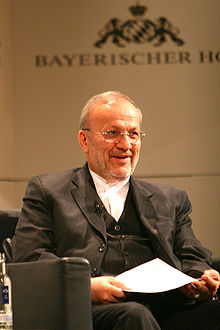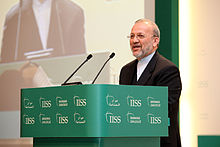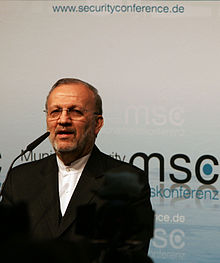- Manouchehr Mottaki
-
Manouchehr Mottaki 
46th Munich Security Conference 2010 Minister of Foreign Affairs of Iran In office
24 August 2005 – 13 December 2010President Mahmoud Ahmadinejad Deputy Saeed Jalili
Mohammad-Ali HosseiniPreceded by Kamal Kharazi Succeeded by Ali Akbar Salehi Member of Parliament of Iran In office
3 May 1980 – 3 May 1984Constituency Tehran In office
3 May 2004 – 24 August 2005Constituency Tehran Personal details Born May 12, 1953
Bandar Gaz, IranPolitical party Islamic Society of Engineers Spouse(s) Tahere Nazari Religion Shia Islam Manouchehr Mottaki (Persian: منوچهر متکی ; born 12 May 1953) is an Iranian politician and diplomat. He was the Iranian Minister of Foreign Affairs. Whilst technically appointed by Mahmoud Ahmadinejad, he is considered to be closer to more pragmatic conservative factions and during the 2005 presidential election, he was the campaign manager of Ali Larijani, the Muslim conservative candidate.
Contents
Life and career
Mottaki was born in Bandar-e-gaz County and went to school there. Bandar-Gaz was considered an important city in the north with a national railroad and several infrastructures during the Reza Shah Pahlavi regime due to its position as a transit bridge to the north mainly to the former Soviet Union. After graduation, he joined the army and as national plan joined the public education program by that day which was conducted by the government. He went to Khorasan province and established a school in a poor village around Mashhad and taught there. After his service in the army, since he was interested in social and political issues, he decided to travel abroad both for experience and study. By that time many Iranians traveled to India, which was seen as a popular academic destination. So he traveled there for a few years before the Iranian Revolution.[1]
Mottaki holds a master's degree in international relations from the University of Tehran and a bachelor's degree from Bangalore University in India.[2]
After the revolution, Mottaki was elected by the people in his home town and the neighboring cities as the first parliament representative and assigned by other representatives as the head of the national security and foreign policy committee due to his politic and diplomatic talents. During his years in Majlis (Congress) and effective collaboration with the foreign ministry, he was employed by the ministry after parliament. He already served as member of parliament in the first Majlis, head of the 7th political bureau of Foreign Ministry (1984), Iran's ambassador to Turkey (1985), Foreign Ministry's secretary general for Western European affairs (1989), deputy foreign minister for international affairs (1989) and deputy foreign minister for legal, consular and parliamentary affairs (1992). He has also been Iran's ambassador to Japan (1994), advisor to foreign minister (1999), deputy head of Culture and Islamic Communications Organization (2001) and Head of Foreign Relations Committee of the 7th Majlis National Security and Foreign Policy Commission. He then developed within the ministry during 24 years of continuous presence in different positions.[3] He worked in many positions in the Majlis until President Mahmoud Ahmadinejad appointed him as Foreign Minister.
Notable positions
Referring to the controversy over Iran's nuclear program, Mottaki has said the referral of the issue to the UN Security Council would be a detrimental move.[4] He has called for negotiations and said Iran does not seek nuclear weapons, and instead wants the same rights as other members of the Nuclear Nonproliferation Treaty.[4]
Mottaki has condemned the outcry over President Ahmadinejad's comments on Israel, calling them a "misunderstanding."[4] At the same time, he has called the Israeli government a "Zionist regime" and said of Israel that Iran was "facing a mad people, which is ruled by madmen."[5]
In July, 2010, in one report from the International Foreign Ministerial Meeting in Kabul, "American, European and other foreign leaders [6] [including] ... Mottaki ... and Pakistan’s Foreign Minister Shah Mehmood Qureshi [and] Secretary-General of the United Nations Ban Ki-Moon met ... to pledge anew their support for Afghanistan as they committed to complete transition of security and budgeting responsibility to the Afghan government by 2014. They acknowledged that neither the people of their own countries nor those in Afghanistan had much patience left. ... The Iranian Foreign Minister used the conference as an opportunity to get in some digs at the foreign forces. The criticism came just a few weeks after the United Nations Security Council voted to enforce sanctions against Iran for failing to halt its nuclear program. 'The presence and increase in the number of foreign forces is one of the factors in the insecurity, violence and dissatisfaction of the public,' said ... Mottaki .... A moment later the United Nations special representative to Afghanistan, Staffan de Mistura, interrupted and told him to get to the point."[7] Another report from Kabul added "Mottaki accused the U.S., Pakistan and allied forces of utilizing Afghanistan to support terrorist strikes inside Iran, including last week's bomb blasts in ... Zahedan, ... Sistan-Baluchistan province." This report said United States Secretary of State Hillary Clinton "hadn't heard [the] comments ... charging the U.S. with supporting terrorism inside Iran"; and said that "Mottaki exceeded his allotted time giving his speech, earning a rebuke from the conference's organizers. The Iranian diplomat said he had the right to give an extended account of the situation in Afghanistan, as Iran has been forced to absorb three million Afghans evading the fighting in their country."[8] A third report said, in part, that Mottaki said "Increase in terrorism because of the active support of the US and NATO of terrorist groups in the region as part of their policy to sow ethnic and religious discord, is proof of the fact that the undesirable presence of the occupation forces has intensified insecurity and violence. Today, insecurity is not just plaguing the Afghan people but is in fact directly mushrooming in neighbouring states, especially in Pakistan."[9]
Dismissal as foreign minister
On 13 December 2010, Mottaki was dismissed as foreign minister by Iranian President Mahmoud Ahmadinejad, something that has been widely speculated as a power struggle within the conservative establishment.[10] Mottaki said, "Dismissing a minister during a mission is un-Islamic, undiplomatic and offensive."[11] Iran State Television reported that Ali Akbar Salehi will replace Mottaki in a caretaker position.[10] Commenting on Mottaki's dismissal, U.S. Secretary of State Hillary Clinton said the U.S. relationship with Iran “is not toward any individual . . . it is toward the country, the government, which is complex and challenging to deal with.”[12]
See also
References
- ^ Mottaki's interview in popular Iranian TV show Sandaliye Dagh
- ^ Mottaki's biography on the official Iranian Presidential website
- ^ Biography of Mottaki, nominee for post of foreign minister
- ^ a b c Manouchehr Mottaki quotes
- ^ Iranian Foreign Minister Manouchehr Mottaki: We Are Facing a Mad People Ruled by Madmen, MEMRITV, Clip No. 2387, February 8, 2010.
- ^ "Iran's Active Role in Kabul Meetings", IRIB English Radio, 20 July 2010 14:13. "Foreign Ministers of nearly 40 countries along with representatives from 30 other states as well as regional and international organizations, and financial institutions." Retrieved 2010-07-20.
- ^ "Leaders Renew Vows of Support for Afghanistan", by Alissa J. Rubin, Richard A. Oppel, Jr. and Mark Landler, The New York Times, July 20, 2010. Retrieved 2010-07-20.
- ^ "Iran Accuses U.S, Pakistan of Supporting Terrorism" by Jay Solomon; Habib Zahori contributed to the article; The Wall Street Journal, July 20, 2010, 9:02 A.M. ET. Retrieved 2010-07-20.
- ^ "Commentary: Iran FM: Occupation Cause of Insecurity in Afghanistan", IRIB English Radio, 20 July 2010 14:58. Retrieved 2010-07-20.
- ^ a b "Manouchehr Mottaki fired from Iran foreign minister job BBC, 13 December 2010, 02:21 P.M. GMT. Retrieved 2010-12-13". http://www.bbc.co.uk/news/world-middle-east-11984931;.[dead link]
- ^ http://www.google.com/hostednews/ap/article/ALeqM5iNwHssMuFElGv49rS4srMzv_2NIw?docId=f36dc37f4ede4601ab9d75e3dfb767f8
- ^ Lakshmanan, Indira (2010-12-13). "Clinton Says U.S. Committed to Diplomacy With Iran". Bloomberg News. http://www.bloomberg.com/news/2010-12-13/clinton-says-u-s-committed-to-diplomacy-with-iran-update1-.html. Retrieved 2010-12-13.
Political offices Preceded by
Kamal KharaziMinister of Foreign Affairs
2005-2010Succeeded by
Ali Akbar SalehiExternal links
- Manouchehr Mottaki, "How Can Anybody Be Persian?" Le Monde, 25 October 2007
- Der Spiegel interview with Iran's Foreign Minister "We Warned the United States"
Ministers of Foreign Affairs of Iran Abdolvahhab Khan • Saeed Khan Ansari • Nosrat-ed-Dowleh • Ali Soheili • Mowzafar Alam • Hossein Ala' • Mahmoud Salehi • Mohsen Raees • Bagher Kazemi • Hossein Navab • Hossein Fatemi • Abdol-Hossein Meftah • Fazlollah Zahedi • Abdollah Entezam • Ali-Gholi Ardalan • Abbas Aram • Jafar Sharif-Emami • Hossein Ghods-Nakhai • Abbas Aram • Ardeshir Zahedi • Abbas-Ali Khalatbari • Amir Khosro Afshar • Ahmad Mirfenderescy • Karim Sanjabi • Mehdi Bazargan • Ebrahim Yazdi • Abulhassan Banisadr • Sadegh Ghotbzadeh • Mohammad Karim Khodapanahi • Mohammad-Ali Rajai • Mir-Hossein Mousavi • Ali Akbar Velayati • Kamal Kharazi • Manouchehr Mottaki • Ali Akbar Salehi
Categories:- Government ministers of Iran
- University of Tehran alumni
- Bangalore University alumni
- People from Golestan Province
- 1953 births
- Living people
- Islamic Society of Engineers politicians
Wikimedia Foundation. 2010.



